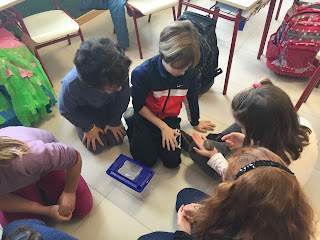Last day we were in the computer room looking at some ebooks for reading.
Here you have the different steps you have to follow to choose one:
1- Go to: www.oxfordowl.co.uk
2- Click in: "My class login"
3- In "My class name" you have to write: reading2ofmay
4- In "My class password" you have to write: cuartodosdemayo
5- Click in: "My bookshelf"
Once you are there, you have to choose the age and the theme of the book you want to read.
I recommend you to start in 5-6 or 6-7.
If you think it is very easy or difficult, you can change it.
Remember you have to choose one book for next week.
Enjoy looking it up!! =)
Para los niños que no puedan tener acceso a internet y leer los libros, se les proporcionará, como ya se dijo en la reunión, un libro de la biblioteca de aula.
En el paso 5, los padres podéis acceder a más recursos para que trabajen los niños pinchando en "Parents".































